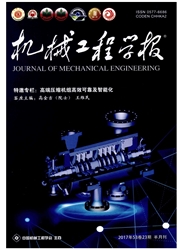

 中文摘要:
中文摘要:
利用电化学测量技术,研究不同温度敏化后的430铁素体钢在模拟汽车冷凝液环境中的电化学行为及汽车冷凝液成分变化对430铁素体不锈钢电化学行为的影响。结果表明,850~1150℃的敏化温度范围内,430铁素体不锈钢随着敏化温度的升高,晶粒度逐渐增大,在模拟汽车冷凝液环境中,零电流电位和电荷转移电阻逐渐降低,耐蚀性下降;430铁素体不锈钢在Cl^–分别与SO4^2–或SO3^2–共存的条件下,比在Cl^–与CO3^2–共存环境中更容易发生腐蚀,腐蚀速度更高;Cl^–存在的溶液中, SO3^2–具有较大的加速腐蚀作用,且随着SO3^2–浓度的增加,维钝电流升高,腐蚀过程有逐渐加剧的趋势;Cl^–和SO3^2–共存溶液中,CO3^2–在一定程度上抑制了430铁素体不锈钢腐蚀过程的进行,降低了腐蚀速度,SO4^2–加速了腐蚀过程的发生,提高了腐蚀速度。
 英文摘要:
英文摘要:
Electrochemical behavior of the 430 ferritic stainless steel (FSS), sensitized under different temperature, and the effect of composition of condensate on the electrochemical behavior are investigated in simulated automotive condensate environment. Results show that the 430 FSS sensitized under temperature within range of 850℃to 1 150℃is characterized by increasing grain size along with sensitization temperature, and both the corrosion potential and the charge transfer resistance of it decreases in the simulated solution, in solution containing Cl^–ion, the existence of SO4^2– or SO3^2– is found to be able to accelerate corrosion processes of 430 FSS other than that of CO3^2–. In solution with Cl^–, SO3^2–plays an important role in accelerating the occurrence of corrosion, which results in the increase of passive current density and the corrosion rate with the increase of concentration of SO3^2–. In addition, the solution contains both Cl^–and SO3^2–, CO3^2–inhibites the corrosion process of the ferritic stainless steel to reduce the corrosion rate, while SO4^2–increases the corrosion rate.
 同期刊论文项目
同期刊论文项目
 同项目期刊论文
同项目期刊论文
 Electrochemical state conversion model for occurrence of pitting corrosion on a cathodically polariz
Electrochemical state conversion model for occurrence of pitting corrosion on a cathodically polariz 期刊信息
期刊信息
